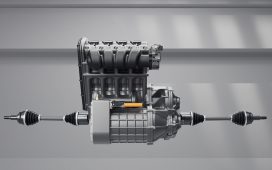“It’s incredibly exciting,” said Benedikt Sobotka, the chief executive of mining company Eurasian Resources Group (ERG). Sitting in front of an audience in January at Davos, the ski resort that hosts an annual gathering of the world’s business elite, he waved a piece of paper with a QR code that he hopes will eventually be attached to every electric car battery in the world.
Sobotka’s excitement reflected his involvement in setting up ReSource, a joint project with fellow miners Glencore and IXM to provide battery “passports” for electric cars. It also hinted at his bigger hopes: that his mining company and its partners could take an influential role in the future of the automotive industry.
The rush to create battery passports has a regulatory imperative: the EU has mandated that every new battery more than 2kWh in size (a smallish electric car battery is about 40kWh) must have its own passport by 2027, containing details of its origins and environmental footprint. People working in the mining industry say that it could also have benefits for ERG, a miner with operations in Kazakhstan and the Democratic Republic of Congo, that has spent years trying to shake off past controversies associated with its subsidiary, Eurasian Natural Resource Corporation (ENRC).
ENRC was founded in 1994 during post-Soviet privatisations by three oligarchs – Kyrgyz-born Alexander Machkevitch, Uzbekistan-born Patokh Chodiev and Kazakh-born Alijan Ibragimov. The oligarchs also control the majority of ERG (although Ibragimov died in 2021 and was replaced by his son Shukhrat).
Through ENRC, the oligarchs built up a huge empire mining metals centred on their operations in Kazakhstan. By 2006, ENRC had annual revenues of more than $3bn and accounted for 4% of Kazakhstan’s GDP, according to legal documents.
ENRC announced its entrance into the international business elite in 2007, when it listed its shares on the London Stock Exchange. Yet during the next six years it faced a slew of controversies.
In late 2010 the company received an anonymous whistleblower letter “which made serious allegations about ENRC’s operations in Kazakhstan”, according to a judgment from London’s high court last year. Details from the letter were leaked to the Times by ENRC’s own former lawyer the judgment said. The judgment said that ENRC had brought in lawyers to investigate “some of its operations in Kazakhstan and then also the Democratic Republic of the Congo in particular, where it was thought that they may have been tainted by bribery, corruption, and fraud”.
Via its current lawyers, ENRC said the allegations in the letter were that it was a victim of fraud, rather than the perpetrator. It was ENRC’s “misfortune that the very person tasked with conducting the internal investigation […] betrayed his client, leaked to the press, and was encouraged by SFO officers to breach his duties to his client”.
The company delisted from the London Stock Exchange in November 2013, after a torrid time as one of the most scandal-hit members in the history of the FTSE 100 index.
ERG was incorporated in Luxembourg in 2013 as the new parent company of ENRC, which has mounted 18 legal actions in the US and UK against journalists, investigators, contractors, lawyers and even the Serious Fraud Office (SFO) since the UK law enforcement agency began an investigation into the fraud allegations in 2013, according to Rights and Accountability in Development, a human rights charity. ENRC said its legal action against the SFO and its former lawyers was found to have merit by London’s high court. No charges have been brought in the SFO investigation and ENRC has strongly denied the allegations of fraud.
ERG employs 100,000 people, including in the world’s biggest cobalt mine, Metalkol, in Katanga in the Democratic Republic of the Congo. It and the rest of the mining sector are racing for the lead in digging out the minerals required for batteries. Sobotka told the Davos audience that the increased demand for batteries was “one of the most staggering growth stories in the history of mankind”.
Sobotka was brought in by the owners to make a fresh start, according to campaigners and analysts. In 2016 Sobotka was one of the founder members of the Global Battery Alliance, a group of companies and non-governmental organisations that discusses standards for the fast-growing industry. Gillian Davidson, an ERG executive, serves as chair of the GBA’s board.
Two of three pilot battery passports the GBA revealed at the Davos event cited ReSource, alongside two other supply chain audit companies. The GBA said it was a completely independent initiative, and it is neutral with regards to providers of battery passport solutions.
after newsletter promotion
Sobotka has tried to pre-empt some of the criticisms of the battery passport, which is being built using blockchain technology that would make it very hard to alter data.
“It’s not something that is hidden in an industry body that is trying to make something a secret,” Sobotka said at the Davos event. “No, it is transparent, publicly available information, and that’s very powerful.”
However, campaigners argue that there will always be questions over whether industry-controlled schemes can ever be relied on for transparency.
In the meantime, the mining industry is looking forward to a boom in demand for lithium, cobalt, manganese and nickel, four of the vital ingredients in a car battery. A study carried out for the GBA by McKinsey, a consultancy, suggested that demand for batteries will grow by as much as 30% a year up to 2030.
Sobotka is clearly savouring the chance to put ERG at the centre of the battery industry’s efforts to improve the transparency of the metals supply chain.
“It tells you something about the magic of Davos,” Sobotka told the audience at the resort. “Four or five people around a table can create something that is now becoming an industry standard. It’s very exciting.”









